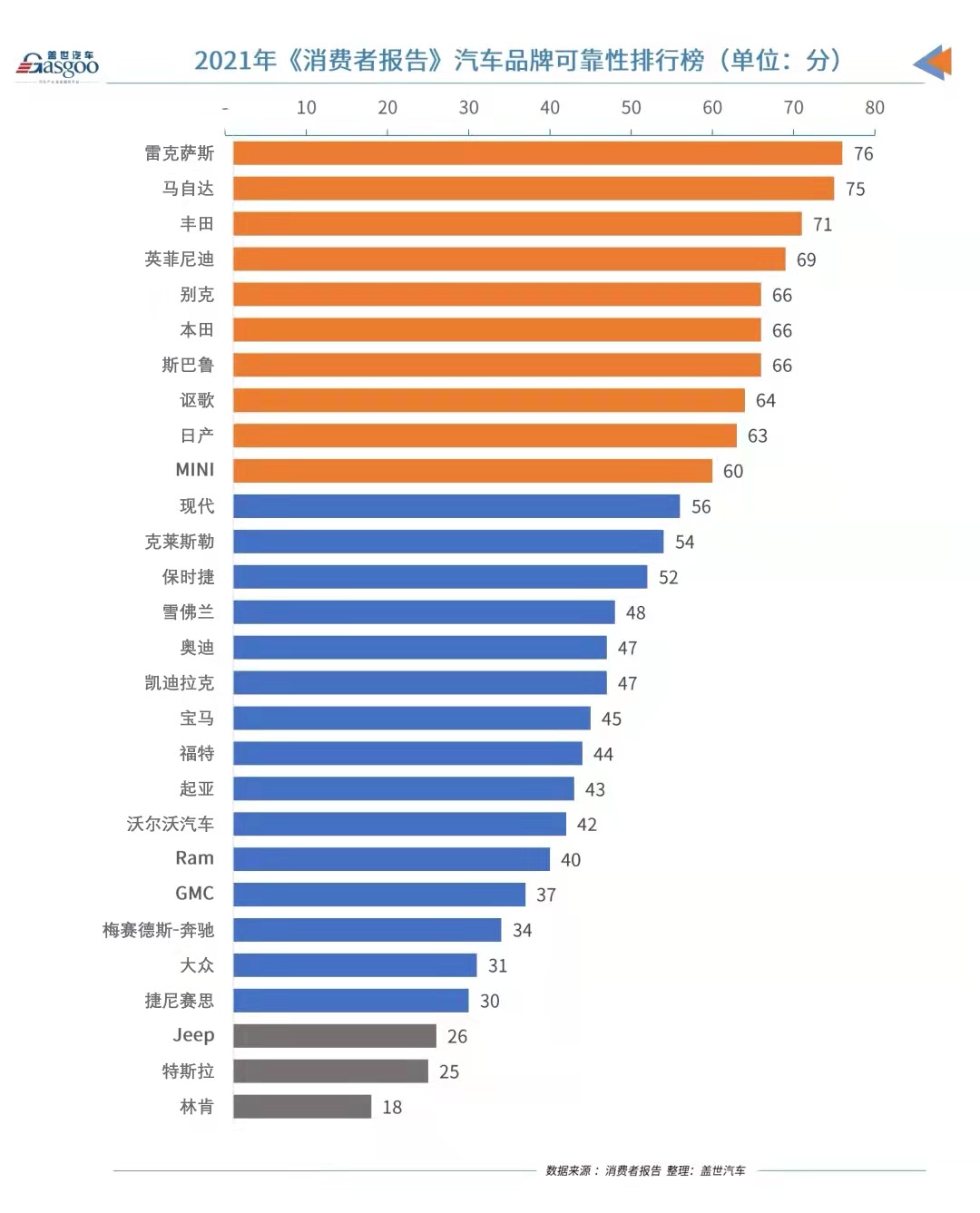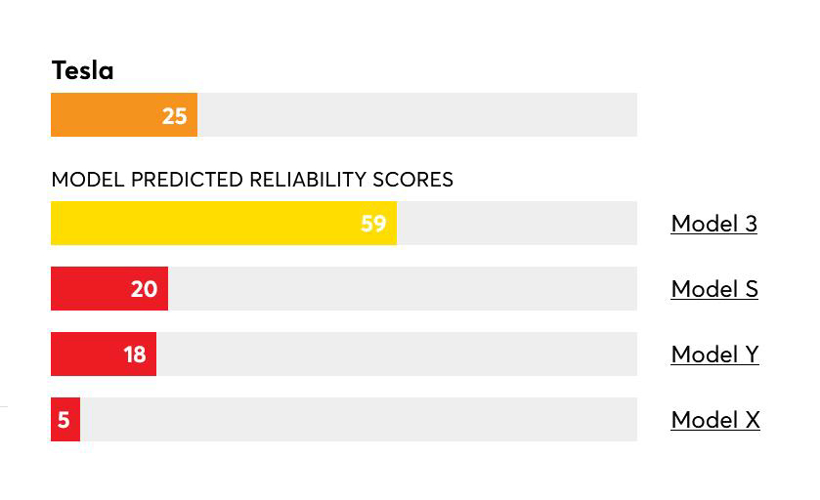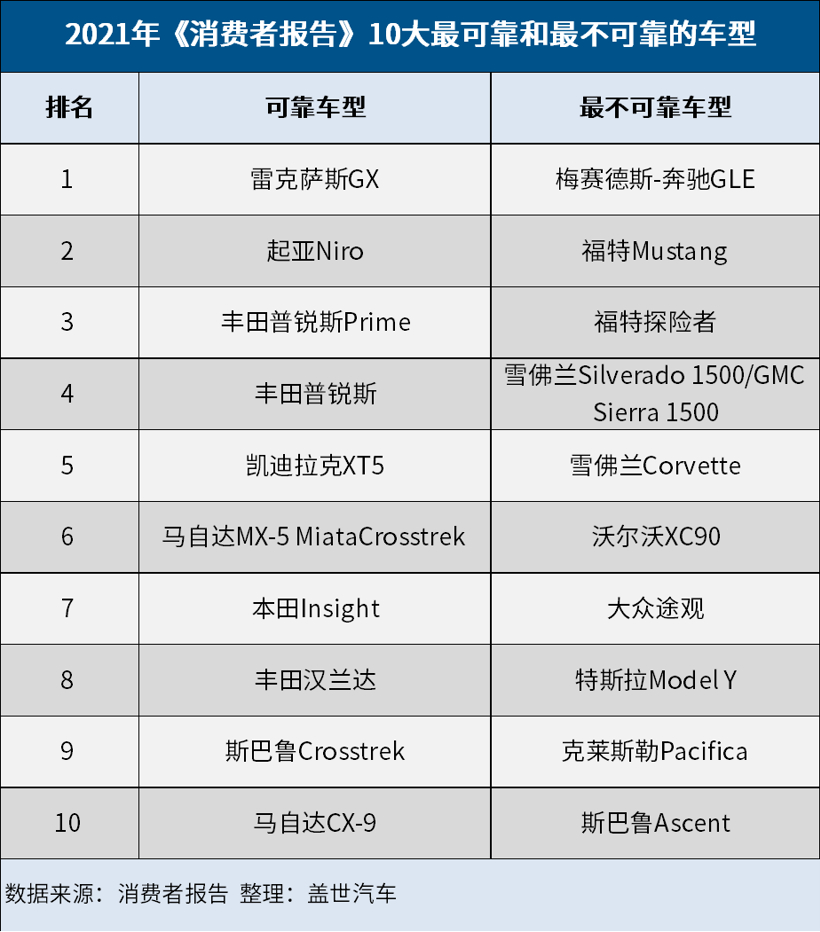On November 18, the Consumer report released the 2021 Automobile Brand Reliability report. Lexus, Mazda and Toyota are once again the three most reliable car brands in 2021, while Jeep, Tesla and Lincoln are at the bottom of the list, according to the report.
The Consumer report's analysis and rating of new car reliability is based on an overall measure of the quality of the car, including road test performance, owner satisfaction survey results, whether the vehicle is equipped with key active safety systems, and crash test results, designed to enable consumers to quickly find the best cars, SUV and trucks that meet their needs.
The Consumer report surveyed the owners of more than 300,000 cars from 2000 to 2021, covering 28 automakers and 144 models already on the market, and used the data to forecast 269 2022 models. The full score of the reliability score is 100, and the average score is between 41 and 60.

Japanese brands dominate the list, Tesla and Lincoln are at the bottom.
Overall, the reliability score of Asian brands is still far ahead, with an average of 62. European brands ranked second with an average of 44 points. American brands have the lowest average score of 42.
Japanese automakers dominate the reliability rankings of car brands, with reliability scores above average. Six of the top 10 come from core and luxury brands owned by Japan's top three car companies, including Toyota and Lexus, Nissan and Infiniti, and Honda and Acura.
Us brands such as Chrysler, Chevrolet and Ford scored average reliability scores, while other US brands such as Ram, GMC and Jeep scored below average. Tesla and Lincoln, the luxury brand of Ford, ranked at the bottom, ranking 27th and 28th respectively.

(photo Source: consumer report)
Tesla's low ranking is mainly due to the problems with the company's Model S, Model X and Model Y from 2019 to 2021. Tesla Model 3 has average reliability, but Consumer report still recommends the model.
According to Jake Fisher, senior director of car testing at Consumer report, Model Y owners often complain about defective sensors that need to be replaced, faulty heat pumps or air conditioners, misaligned body panels, and leaks in the trunk caused by missing seals. Car owners also reported various electrical and hardware problems with the higher-priced Model S sedan and the Model X Eagle door SUV.
Older models tend to perform better in terms of reliability, mainly because companies tend to adjust and redesign known problems while insisting on using the same parts and suppliers.
But Tesla took a different approach from them. "during the year, Tesla almost randomly replaces major components, suppliers or sensors and other components," Fisher explained. The more you change, the more likely you are to have problems. "
The proportion of electric vehicles on the list expands, and there is a big difference in score.
On Consumer report's list this year, battery-powered electric vehicles account for a larger proportion than ever before, but their reliability scores vary widely, and gas-electric hybrids are one of the most reliable cars as a whole.
Fisher said Consumer report rated 11 all-electric models from eight brands, including five all-electric SUV. "at present, the entire car market is moving towards pure electric vehicles, and we would like to know what impact this will have on reliability rankings."
Overall, the reliability ratings of electric vehicles vary widely. Tesla Model X and Audi E-tron ranked bottom in reliability scores in the field of electric vehicles, while Kia Niro's "reliability score is well above average". The reliability scores of Nissan Leaf and Ford Mustang Mach-E are "above average". The report shows that the high-end electric SUV is one of the most unreliable models.
Fisher pointed out: "in theory, pure electric vehicles should be as reliable or even more reliable as traditional internal combustion engine cars." The key is how they adopt this technology. " It is not the electric transmission system that affects the reliability score of electric vehicles. Instead, Fisher blames the low reliability score of electric vehicles on unnecessary high-tech features. "for new electric cars, it's best not to add too many unnecessary technologies."
Fisher said Tesla's success among consumers has put pressure on other automakers to attract consumers with a variety of entertainment and practical features. But Fisher believes that the introduction of more software, hardware and features will increase the complexity of the car, which may affect reliability ratings.
Although the reliability of electric vehicles is average, hybrid vehicles and plug-in hybrid vehicles are the most reliable models. "the most reliable are compact hybrids and plug-in hybrids, which may be at odds with popular belief that these two types of cars have the most complex powertrain and affect their reliability scores," Fisher said.
But in fact, popular hybrids such as the Toyota Prius and the Honda Insight have been on the market for years, and automakers have discovered and solved previously discovered problems, so they have high reliability scores.





